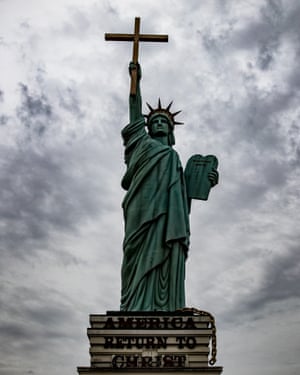The emboldened religious right has unleashed a wave of legislation across the United States since Donald Trump became president, as part of an organised bid to impose hardline Christian values across American society.
A playbook known as Project Blitz, developed by a collection of Christian groups, has provided state politicians with a set of off-the-shelf pro-Christian “model bills”.
Some legislation uses verbatim language from the “model bills” created by a group called the Congressional Prayer Caucus Foundation (CPCF), set up by a former Republican congressman which has a stated aim to “protect religious freedom, preserve America’s Judeo-Christian heritage and promote prayer”.
At least 75 bills have been brought forward in more than 20 states during 2017 and 2018 which appear to be modelled on or have similar objectives to the playbook, according to Americans United for Separation of Church and State, a campaign group which tracks legislation that undermines the principle of separation of church and state.
Opponents warn that the CPCF (which claims more than 600 politicians as members across state legislatures ) is using the banner of “religious freedom” to impose Christianity on American public, political and cultural life.
In Alabama, Arizona, Florida, Louisiana and Tennessee, so-called “In God We Trust” bills have become law since 2017, which will see the phrase emblazoned on public buildings, hung in schools and displayed on the side of public vehicles including police cars.
But the Project Blitz playbook sees those largely symbolic bills as just the first stage on the way to more hardline laws. They are presented as measures to preserve religious liberty, but are intended to give businesses, pastors and childcare providers the right to discriminate against LGBT people in line with their “sincerely held religious beliefs”.
Samantha Sokol, who studied the bills for the Americans United for Separation of Church and State campaign group, said: “In God We Trust bills are the most common. We had 26 of those, they really just exploded this year. .
“I think that it is due to the promotion of Project Blitz. They have sent this playbook to state legislators and told them that these In God We Trust bills are the first step.”
She added: “Some would see these bills as very trivial and unimportant, but even the most simple or trivial bills would really undermine American religious freedom and separation of church and state, and undermine the promise of our public schools that kids are welcome, whether they are religious or non-religious, whether they are evangelical Christians or not.”
Frederick Clarkson, senior research analyst at Political Research Associates, a thinktank which studies the political right, was first to write about Project Blitz, which he said had been hiding in plain sight.
“It’s very rare that you come across a major primary source document that changes the way you view everything, and this is one of those times. This is a 116-page strategy manual hidden away on a website explaining at least what a section of the religious right are doing in the United States. To me that’s astounding.”
The playbook came to wider attention in April after Clarkson was tipped off to its existence. He also highlighted recordings of conference calls where leading figures in the CPCF set out their plans to flood state legislatures with bills.
One of the steering team behind Project Blitz is David Barton, the Texas-based founder of an organisation called WallBuilders, which takes its inspiration from the Old Testament in describing a a mission of “rebuilding our nation’s foundations”.
In a recording of a call with state legislators, he describes in detail the strategy behind Project Blitz, which he said packages together about two dozen bills in separate categories based on the type of opposition they are likely to receive. There are three categories of bills in Project Blitz.
The first category of “In God We Trust” bills are likely to trigger opposition by saying the bills are a waste of time, or the sponsor of the bill “just wants to fight culture wars and divide people”.
Part of the strategy is to pave the way for later political attacks, painting an election opponent as “anti-faith”. Recent attacks on a Minnesota Democratic politician by Republican opponents followed exactly those lines.
Barton told legislators on the call: “They are gonna be things people yell at, but they help move the ball down the court, really if we can do this, get this going with all the states, it’s kind of like whack-a-mole for the other side, it’ll drive ‘em crazy that they’ll have to divide their resources out in opposing this.”
Category two include bills for a range of proclamations or resolutions – declaring a religious freedom day or Christian heritage week that can then be used to get religious teaching into schools. The playbook adds: “If any legislator opposes this, it will be helpful to get him or her on the record against this heritage and freedom.”
Category three bills will have the greatest impact but will be “the most hotly contested” the playbook says – they include resolutions in favour of “biblical values concerning marriage and sexuality”, such as “establishing public policy favoring adoption by intact heterosexual, marriage-based families” and “establishing public policy favoring intimate sexual relations only between married, heterosexual couples”.
The playbook warns that the most far-reaching model bills – designed to deny LGBT people access to adoption services or marriage services – are “more dangerous” because they will face well-organised and financed opposition.
According to the Americans United for Separation of Church and State analysis, Oklahoma and Georgia have brought forward but not passed “adoption refusal” Child Protection bills. And six states have “wedding services refusal” measures, often framed as Pastor Protection bills, although none have become law.
A recording of the call is still on the CPCF website, dated 13 February2016, although it actually appears to have taken place in February 2017, because it refers to events of the early days of the Trump administration.
THE CPCF did not respond to request for comment on Project Blitz. Lea Carawan, director of the CPCF, said on the call that
the Trump administration was more receptive than any in over 30 years, adding: “We believe this is just the beginning. There is a powerful momentum that is happening.”
Trump - on his third marriage and mired in controversy after paying off a porn actress -
has been a useful ally for Christian evangelicals, appointing more than 20 conservative judges, including filling the supreme court vacancy with conservative justice Neil Gorsuch.
The supreme court is due this month to give its opinion in a case where a cake shop owner refused to provide a wedding cake for a gay couple.
Andrew Whitehead, assistant professor of sociology at Clemson University, recently published a study titled Make America Christian Again which concluded that the more someone believed the United States was and should remain a Christian nation, the more likely they were to vote Trump in 2016.
Whitehead described the so-called quest for “dominion” as the aim of Christian nationalists who consider that the Christian faith and their particular interpretation should be imposed.
Clarkson, whose research first highlighted Project Blitz, said: “It’s a Christian supremacist agenda, the idea that God intended and mandates Christians to lead and control the United States for the religious vision that they hold and the policy implications that flow from it.
“If you are a more liberal Christian, a Jew, or a Muslim, or a non-believer of any sort, or whatever you happen to be, you’re a second class citizen at best.
Since you’re here …
… we have a small favour to ask. More people are reading the Guardian than ever but advertising revenues across the media are falling fast. And unlike many news organisations, we haven’t put up a paywall – we want to keep our journalism as open as we can. So you can see why we need to ask for your help. The Guardian’s independent, investigative journalism takes a lot of time, money and hard work to produce. But we do it because we believe our perspective matters – because it might well be your perspective, too.
I appreciate there not being a paywall: it is more democratic for the media to be available for all and not a commodity to be purchased by a few. I’m happy to make a contribution so others with less means still have access to information.Thomasine, Sweden
Thank you to the many people who have already supported us financially – your contribution is what makes stories like you’ve just read possible. We increasingly need our readers to fund our work so that we can continue holding power to account and producing fearless journalism.
For as
For as


Nenhum comentário:
Postar um comentário